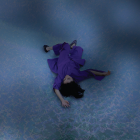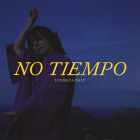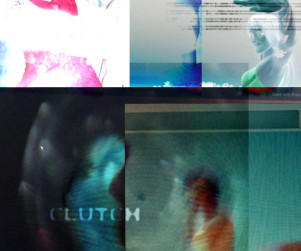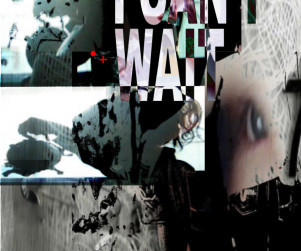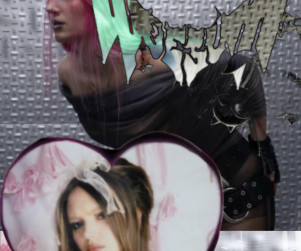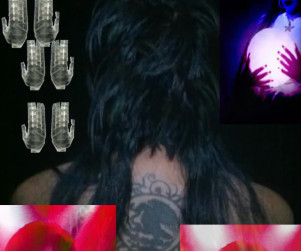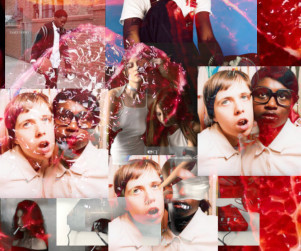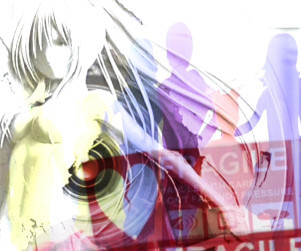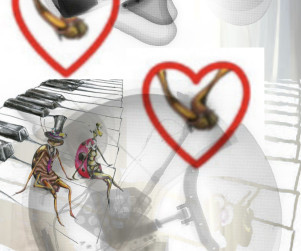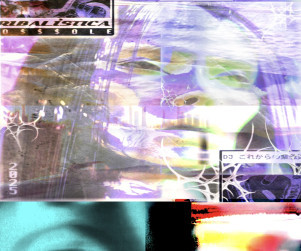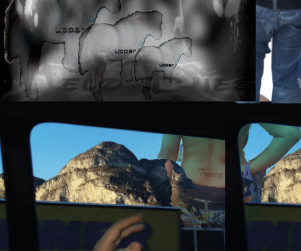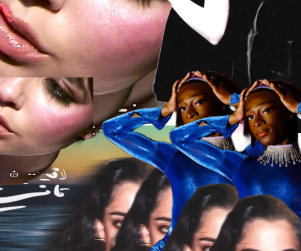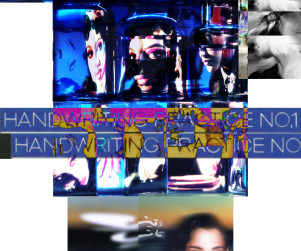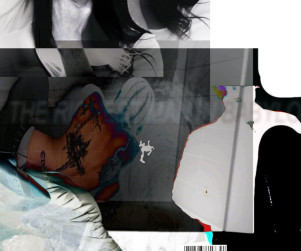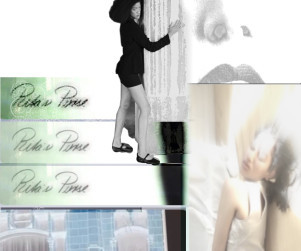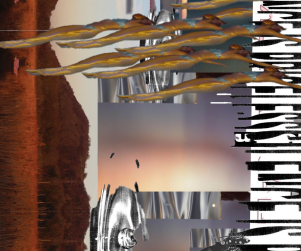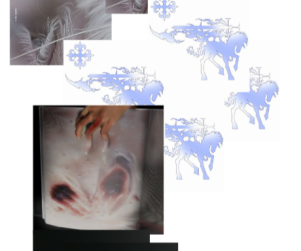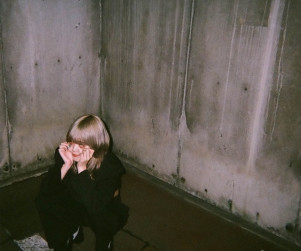Das neuste Album ¡Ay! von Lucrecia Dalt hat mich überrascht. Ich konnte nicht auf den ersten Blick erklären wieso, doch es war etwas, was sich verändert hat. Verändert im Vergleich zu früheren Alben. Doch dann fiel es mir auf. Das Album trägt mich mehr, als dass es mich fordert. Es umhüllt mich und trotzdem spielt es mit mir.
Auch immer wieder tauchen leichte, sehr vertraute Klänge auf. Mambo, Salsa und Teils ein Büschen Merengue. Auf ¡Ay! lässt Lucrecia Dalt Vergangenheit mit Gegenwart zu neuen Wegen verschmelzen. Es fühlt sich an wie eine Reise. Aber nicht eine, die am Anfang beginnt und bis zum Ende geht. Sondern eine, die ihre eigenen Wege einschlägt.
"Creating possibilities for horror and exploring horror is an antidote as well for the current horror we live in."
Für das ganze Interview mit dem neuen Album klick hier:
Für die Ungeduldigen, hier das Interview ohne Musik:
Und für die Podcast hassenden, hier die geschriebene Version:
Annie
First of all, like how are you doing? How's life? What's going on?
Lucrecia Dalt
I am doing great. I've been just. Uhm, preparing the live show? So that is the only thing I'm doing now, like preparing for the live show and preparing the live show. So, it's been a lot of. I don't know. Exciting work, shaping life, and getting ready physically and training a loud voice and all these things, yeah. And you know.
A
Something I was really wondering when I was looking at your work is UM. Would you rather see your work in the field of music or in the field of art and performance?
L
I think everywhere. I really like the crossings of formats and possibilities really. So, I don't. You know, I love cinema as much as I love music as much as I love performance. And I would like to if something will try to bring that complexity to bring the possibility to everything that I'm doing so... yeah and I think this work is really about that. Like bringing together all the things that I care about and like and trying to bring that to the show. So, the show is kind of like a question about that too. Like is it a performance? Is it a show? Is it a play? Like all these things? And I am, I love crossing those boundaries. I think it's a... It's healthy for me, at least. Artistically, I feel more complete, yeah. When I'm not, like, in one specific pocket or something like that, yeah.
A
And in which specific pockets do you start and for your work, is it kind of as well a crossover or do you start specifically with music and then see what's going on with the performance part?
L
Yeah, I think it's changed from album to album. It's different from the past. I don't know. No era sólida for example, like everything was happening at the same time. Like the concept was fitting the way that I was working and the way that I was working was kind of fitting back into all their ideas and stuff like that but in this. I was really... Just the first thing I started to do was to work on the music and very, very simplistic, you know, like just sitting at the keyboard working on progressions and imagining possibilities and in that very, very minimal format. And then add and add and add and add layers. Later on, 1st on my own and then with other players like I added upright bass and clarinet and flute, percussion, trumpet. I did and then work on on the how I wanted all these sounds because it was like a very dedicated crafting not only on myself but then after working with Marta Salogni to give the final touch and then after that it's like... So parallel that a little bit later on in the composition process I was developing all the ideas and writing the lyrics and making it like a conceptual album. And then how could that finally be justified into certain instrumentation that I was using so that it feels like it comes together? Because it's like two different worlds put together a kind of randomly like a sci-fi story with this type of music. But yeah, so that's more or less how it happened for this one.
A
And I feel like, or probably that will happen to me. Uhm, do you ever get like completely lost in this whole process or is that kind of a part of it to like find the certain way how you want to have it in the end?
L
Yeah, totally. Absolutely. And sometimes I even get lost right when I finished and I'm completely certain or... I don't know for this one, it it happened that I finished the album and then I was heavily working on a score. So I was so... So into that world of the score. And then I finished the score and I listened back to the album and my first reaction was to call Alex my percussionist and say "I can't, I need to trash this album. This doesn't make any sense." And then he was like, "What? No. It's because you've been too much into this other dimension of working in a very specific way." And it's true. Like sometimes it's like being lost and being confused by the work or in the process is like part of it. And I think I've learned a little bit or I don't know, I still get surprised too, you know, to psychologically have these sort of mood swings to the work and justice and making it part of it, but it's never been as radical or intense as to trash a full, you know, work, but just to make it part of the frustration. I don't know. Yeah, some times are... I feel lost with a song, for example: Enviada was a very specific case: I was, you know like sometimes works reach like a state of corruption or something like that, but you added so much and you thought so much about it. That is like. It's like broken. Something is broken in there and I really thought that was going to be the case. And then just by listening to something else that's completely different music. Then I started to feel, oh, maybe I should do this and this and. This and that, and then. You kind of save it. Uhm, somehow, yeah.
A
More question about how you work: when you're in this state and you feel like lost, how do you get like kind of back on track? Is it just like doing something else and then going back? Or are there like, people important in your album that like, help you with like we're talking about it and everything?
L
Yeah, yeah, totally. I mean, both are. As an internal process, I think I would just do something else. And it usually would mean I would watch a movie or I listen to something else, or I just do nothing, you know, like I just leave: Space, stillness or whatever that is. Although I'm a, you know, I'm quite obsessive worker and I love you know, dedicating a lot of time. But yeah but feedback is also very important and I'm trying to... try to. I mean there are a few people that I always show my work to Miguel, Alex... And I'm always telling them to be as honest and as open as they can to really let me see what they think. So that is always very helpful to have that because. Yeah, sometimes, yeah, you just need... Even to contrast or to even oppose their opinion as well. Or find a way to justify what you do in a stronger way or something like that. So yeah. Definitely. For me, super, super important to have that feedback.
A
I was reading a part. It was an interview or something? And the people were talking about that like you were trying to like. Uhm, capture the moment when it becomes pure sounds. And I feel like that is kind of really in a way specific part, but not with like a story or history in it. So I wanted to ask you what is important in this album which is coming in October. Is there a history part or a story which you're like kind of trying to put into sounds or is it more your surrounding that you put in sounds?
L
Yeah, that sentence was related to my past album, No era Sólida. And actually that was the best way I could express what I was trying to do in the studio that last time because I was working a lot with the voice, and I was kind of forcing myself to try to see, how can I not do the usual things I would do with my voice just naturally 'cause, you know, you, you fall into patterns or whatever. So I would do exercises in which I would listen to other singers and usually singers that don't sing in my language and listen and listen and listen. And then after that, I feel like my brain was so embedded to this form that I would suddenly start to do melodies or patterns that I wouldn't do really myself. So that that's why I was like OK can I actually isolate this part of the, of the, of the body to make it almost, you know as our throat to make it almost autonomous like automatic writing or something like that. you know.
So that was exercises to try to force that process and so that's why I expressed it kind of more poetically in this way. But for this album it was totally different. Sound and atmosphere were very important because I wanted to capture or bring like that idea of the atmosphere of growing up in Colombia and listening to this type of music: boleros, salsa, merengue and all those, generals with my family and friends and... And as a general environment of the time, that I grew up there. But trying to bring it kind of diluted to my current way of working with the machines with modulars with all that and see how could I... How could I process the signal so that it becomes a tiny bit alienated but not so heavy like I would have done it in the past, that is almost a little bit difficult to recognise some of the... Yeah, some of the sounds unintentionally so, but in this case, it was more like, "OK, there is a percussion element and there is an extra layer of texture working with envelopes and working with rhythmical envelopes to affect that signal. And to make it even richer... Rhythmically through those processes, but still you can recognise that there are congas, bongos and all that, you know, like recognisable instrumentation, yeah."
A
Yeah. And I feel like this part makes it kind of more accessible. If I compare it to the last album.
L
Absolutely, yeah. I feel like.
A
And i feel like your heritage is always an important part of your music, of your work and... What changed between the last album and this album? Where is your view at the moment for this album where you can hear these changes so much?
L
Yeah, I think I mean the pandemic obviously contributed to that in the way of... Not only generating a heavy load of nostalgia, of listening back to me... I mean trying to feel connected to the family in this, in these bizarre circumstances. You know, when my sister is in another part of the world, my parents are in Colombia,... and I guess the music that I was listening to a lot during this time was... Like... I couldn't. I couldn't really listen to experimental music or anything else except for like, Rock, dub and tropical music and stuff like that. So with that atmosphere, I was like: "OK, I guess the time has come for me to try to explore something in this line and see what I can do. with exploring these rhythms a little bit more in a more literal way, like some pop structures at least quite embedded, and then see what happens. I don't know why. Yeah, it just happened and I just enjoy the process and I let it be. And in contrast to previous albums, which were more like real explorations of our moments of a technique or something like that, like No era sólida is really the result of just spending enough time with the machines to find certain patterns of work in certain ways and applying that to life and how the live feeds back into an album. But in this case, it was really: "OK. I'm going to make pieces that feel, you know, very, very concrete and closed and that have all these structures." And yeah, it was just... Enjoying doing that and I let it yeah be.
A
So this album is compared to the others more emotional?
L
Uh, it's different. It's just a different type of emotion because No era sólida is rally intense, it's really full of like UFFfff and I...
So it's different. It's definitely exploring different sites and actually: When the pandemic and everything happened that album felt really bizarre to me, even though I understand that, you know, like. Creating possibilities for horror and exploring horror is an antidote as well. For the current horror we live in. So I came to understand it more like that way. But definitely with this record I was a little bit more looking for, uh, emotional comfort and in my soul... It's very much like: "OK, I really... If there are moments of abstraction of weirdness because they're easing the album or creeping a little bit, it's going to be more like embedded. It's not going to be the main thing that you hear and there are definitely tracks which I thought like No Tiempo or La Desmesure are just for the joy, you know, the joy of making something fun and beautiful and embracing that beauty, which I haven't done for a while. I guess in this more direct way, but more like in albums 10 years ago or something like that, yeah.
A
People like me who don't understand what you're talking about, bc of the barrier of language but I feel. Like... A lot you're talking about I can kind of understand because I feel what you were trying to put in your music, but uhm, still like the actual things you were talking about I can not understand. And what do you think is like, uh, the difference between or how do you think is it connected the feeling you're trying to give and the actual writing.
L
And yeah, it's an interesting question because I didn't write the lyrics way until I have developed the music and what the voice was doing. Except for a couple of tracks that really developed through the lyrics, it became what it became, but for example No Tiempo. It was a song that I already had the voice structured in what I wanted to convey so... But in a way, then the lyrics relate to that feeling because the lyrics are... Even though the whole story of the album has to do with this sci-fi. I am story about an entity that comes to the Earth. Certain ideas are very really related to what the song is also trying to convey. I feel like it's, it's kind of deluded in time. Like that was the intention really, like it's a sustained sort of feeling like that's how I wanted it to be. I thought it somehow complemented it. It complements it. It is like another part of the story, another part of the experience. But I don't think it's absolutely necessary, in fact. Uhm. To comprehend the lyrics specifically, in fact. For Spanish speakers it is not absolutely easy to understand, because I'm expanding the word so much that is a little bit difficult, and I make it intentionally so, so that you are more like lost in the texture of the voice. And the words are there as a meta-message, but not specifically as a: "OK, this is it. This is.. this is what it is." And the voice or something like that, yeah.

